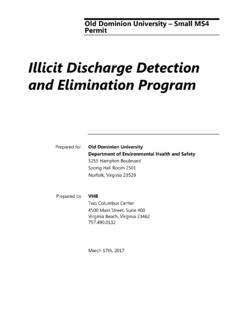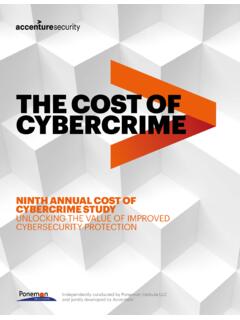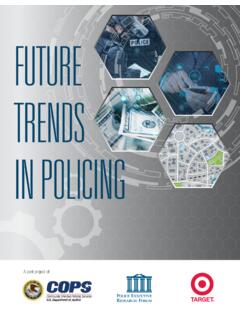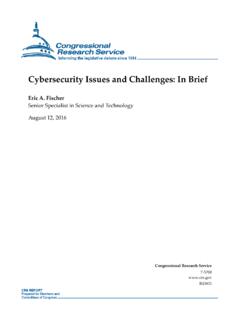Transcription of Cyber Security: Cyber Crime, Attacks and Terrorism
1 ODU UN Day 2020 Issue Brief GA First Committee (DISC) Cyber security : Cyber crime , Attacks and Terrorism Nick Myers ODU Model United Nations Society Introduction Technology has revolutionized the interconnectedness of the globe. The flagship of that globalization is the Internet. However, like all other interconnecting technologies before it, the Internet can become a weapon in the eyes of states , criminals, and terrorists alike. Known as either Cyber war or Cyber conflict, these attempts to disrupt information technology systems have provoked an increasingly desperate debate on how to respond. As UN Member states struggle to protect their networks and linked infrastructure from disruption, security against foreign-based Attacks has become vital.
2 Member states are concerned about the potential to affect individuals, corporations, states , and regional systems. The anonymity of Attacks is a major part of the problem; attackers can swiftly disable individuals, government agencies and private firms, without revealing who carried out the attack in the first place. Given the transnational nature of many of these Attacks , international organizations like the UN have been increasingly pressured to address the rise of Cyber - Attacks and the security measures against them in the hope of eliciting new international regulations regarding Cyber security . Yet, the UN is not without problems of its own in addressing the issues surrounding Cyber security and Cyber Terrorism . Broadly, the UN is faced with a major roadblock related to Cyber .
3 Member states have varied positions on whether the UN should have oversight over what a nation does in cyberspace. Some Member states insist current international laws can sufficiently deal with Cyber threats. Other Member states fear expanding international law will be used to narrow their national power, or might undermine their freedom of action. Currently, cyberspace is viewed as an extension of international law, meaning Cyber - Attacks are viewed as legally the same as physical Attacks rather than as separate issue without its own norms. There is some interest within the General Assembly and the security Council to address Cyber threats by creating new norms for Cyber response and use. But the disconnect between the international dangers and national capabilities in cyberspace weakens the potential for forceful UN action, even when it is needed most.
4 Many Member states want the entire UN community to take an active role responding to the threats posed by Cyber - Attacks . They say that more effort needs to be put into this issue within the General Assembly especially, since that is where global moral principles are agreed. The current ambiguity surrounding Cyber - Attacks leaves long standing questions about the definition and meaning of an attack and its consequences in doubt. The ambiguity Cyber security : Cyber crime , Attacks and Terrorism 2 undoubtedly helps attackers and those who would use the Internet for malicious purposes. Growing demands for new rules and approaches to cyberspace have been heard from several Member states . This shift led to several resolutions over the past few years.
5 But other Member states worry that international action could be a veil for efforts to restrict their freedom of action, or advance the particular interests of specific countries. Where growing demands for action will lead is hard to judge. In an ever-integrating global economy, the prospect of Cyber threats looms over everyone. The remains the most prominent forum for addressing global issues. Important steps have been taken to address these threats, including in the General Assembly, security Council, and several UN technical organizations. These have established important principles to guide international action. But calls for more aggressive action have gone unmet. If Member states wish for a true universal approach to solving the issues of cyberspace, more work needs to be done.
6 History of Cyber crime The trajectory of cybercrime in global politics has been on the rise as internet connectivity and other aspects of information technology have spread around the globe. While there is no standing agreement on an international definition of Cyber -attack or Cyber Terrorism within the , rough working definitions have been considered to be broad sweeping online criminal activity in all of its forms. Generally, a Cyber crime or attack must serve a destructive or illegal goal. Cyber terror pursues political 1 Cyberterrorism Vienna: UN Office on Drugs and crime , 2019, objectives through Cyber actions to harm, coerce, or intimidate a population or Much like terrorist Attacks , the perpetrators of cybercrime are difficult to identify unless such Attacks are claimed by a specific organization.
7 Many Attacks remain unclaimed, no matter which victim is attacked. There have been repeated identifications of the location of the attackers, but the forensic process typically is very slow. While an attack may happen in minutes, identification of an attacker can take months, under the best circumstance. Over time the occurrences of Cyber - Attacks have diversified and intensified, with an increasing variety of more noticeable Attacks being enacted all over the Still, the major problem with Cyber security is the speculative nature of the threats. The range of possible threats is quite broad, both to governments, businesses, and individuals. Some of the most well-known possibilities include: Attacks interfering with internet related networks, installations, server parks, major firms.
8 2'Significant Cyber Incidents Since 2006, Washington, : Center for Strategic and International Studies, September 2020, Cyber security : Cyber crime , Attacks and Terrorism 3 Attacks on financial industries such as banking and securities trading. Attacks denying access to defense ministry computer networks including email and other sensitive systems. Energy industries, electricity generation and distribution, including oil refineries and oil and gas pipelines. Interference with critical infrastructure such as emergency services, hospitals, energy generation and distribution, or transportation. Attacks on government systems by criminal, terrorist, or revolutionary organizations seeking information. Violation of commercial and individual privacy Still, the groups most likely to carry out a Cyber -attack are already incredibly powerful Countries like China, Russia, and the are powerhouses in offensive and defensive use of Information and Communication Technologies (ICT), though other states are more than capable of using Cyber weapons.
9 The playing field is opening up though, as organizations have risen to try and combat Cyber - Attacks from Cyber terrorists. These include international organizations like the UN Office of Counter Terrorism (UNOCT), the International Telecommunications Union (ITU), and reports from organizations like the United Nations Institute for Disarmament 3 James Andrew Lewis, 'Dismissing Cyber Catastrophe', Center for Strategic and International Studies, 17 August 2020, 4 Camino Kavanagh, The United Nations, Cyberspace and International Peace and security : Responding to Complexity in the 21st Century. Geneva: United Nations Institute for Disarmament Research, 2017, Non-governmental organizations have also seen a sharp rise in popularity, with some of the biggest being the Internet Watch Foundation and the Rand Corporation.
10 In many cases, these nongovernmental organizations are much more successful in dealing with Cyber - Attacks and security , simply because they are not tied down by an international system such as the and have more capabilities to not only diagnose Attacks but also prevent them. The organizations above are a few of the many entities created to combat the ever-growing scope and nature of the Cyber realm. The Current Situation The bulk of these Cyber - Attacks have been largely attributed to a variety of hackers and sparse few terrorist organizations, but there have been prominent Attacks by states against other states over the course of the past fourteen years. Below are some prominent examples of Attacks designed to disrupt information networks, access critical materials, destroy data, or mislead the public of various states .


















